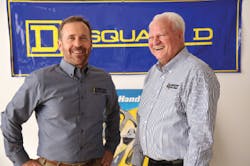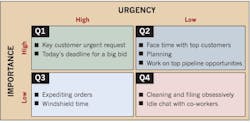Latest from Sales
Staying Relevant All Day Long
How to Write a Call Report
Sponsored
Getting into the Flow: A new formula for success, Part 2
We are working to create an environment in which our salespeople can more frequently operate at peak productivity and achieve a “flow” state. As we discussed in the first article in this series (“Getting into the Flow,” EW — Feb. 2015, p. 17), flow is the confluence of laser-like focus with extraordinary concentration and passion that enables extraordinary performance in any endeavor, including music, work and sports. We think salespeople can harness the flow, too.
One way we can harness the flow is to attack the most obvious impediment to reaching it — a lack of focus. There are too many demands, too much data, too many emergencies and too many conflicting expectations facing our salespeople. Improving this situation requires an extreme level of focus for us and continuous teaching and coaching on it to our salespeople.
You will fail as a salesperson if you try to do everything and to do it all well. Successful salespeople identify the most important things and consistently do those very well. Too much information, too many demands and too many distractions jockey for your attention, leading many salespeople to become reactive, simply “fighting fires” and “spinning plates” in an attempt to avoid calamity and embarrassment. All the while the most important things get insufficient attention. This leads to a sense of lack of control which is not conducive to flow states at all.
Focus, the ability to identify the most important things and subordinate all other things to them, is essential to your success. You may be surprised to hear this, but the vast majority of things salespeople do don’t matter. Think about all of the time you spend doing unimportant things. Windshield time. Time spent doing paperwork. The face-to-face time you spend with the wrong people at the wrong customers. Tolerate mediocrity in these activities, and strive for excellence in more important activities.
Important activities require your highest skill level, like earning the trust and respect of your most important customers, preparing a large quote for an important customer, or planning. Such activities can be intimidating because they stretch you to your limit. But that’s where you learn and grow and that’s where you will experience “flow.”
Then, there is urgency. Even though much of your time must be spent on urgent matters and emergencies, you must recognize the downside of that and develop the habit of working on important matters every day before you make yourself available to work on other things. Working on urgent matters feels good, but it’s a trap you must avoid. When you are under urgent time pressure you and other members of your team make more mistakes, overlook opportunities, and simply do not do your best work. Some folks brag that they do their best work under urgent pressure. Actually, that’s because they fail to prioritize the important matters and focus on them before they become urgent. To them, work done under pressure does seem better — better than nothing.
Use the chart on this page to clarify your “Urgent” versus “Important” tasks. Add to the lists in each Quadrant so you and your teammates agree. After that, read the brief recommendations below on how to treat tasks in each Quadrant.
Q1. Important and Urgent? Just do it. Time spent in this box is mostly firefighting. It’s a stressful box to be in, and you should try to minimize time spent here. The best way to do so is to diligently work on these tasks and complete them before they become urgent.
Q2: Important but not Urgent? Schedule work on these each day, without fail. This is the quadrant in which you must spend time every day so that you develop your skills in these important activities. Because these tasks require your highest skills and have emotional intensity, there is the greatest opportunity for you to frequently enter into flow. That will increase your success and gratification immeasurably. These are the tasks that you want to perform so routinely, so habitually, that they become second-nature to you.
To make time for these activities prioritize them, do them first every day, before the day’s urgent tasks, and “time block” to insure they get the attention they deserve (more on Time Blocking later).
Q3: Urgent but not Important? Delegate these or try to “weasel out”! These activities are like candy — they feel good but do little for you. They can be very rewarding to work on because you feel good about being responsive under pressure, or being a problem-solver. But they are not important tasks, plain and simple, and they suck your time, and will not contribute to your success.
Q4: Not Urgent and Not Important? Just say no! Dealing with these activities is simple, Say No! Don’t do them! Idle chat, paper-pushing exercises, and pointless phone calls must be avoided. Dramatically reduce the time you spend in this quadrant to spend more time in Q2.
The 80/20 Rule does not apply to you. The 80/20 rule, also called the “Pareto Principle,” is familiar to us all. Vilfredo Pareto, the Italian intellectual for whom the principle is named, called it the “law of the trivial many and the critical few,” the notion that a large percent (80% or more) of your outcomes result from a small percent (20% or fewer) of your efforts. Don’t even think of doubting it. It’s simply the truth.
The 80/20 Rule no longer applies in today’s electrical industry because 80/20 has become 90/10. That is, trivial activities have multiplied geometrically and, without an extreme application of focus you become a Champion of the Trivial, a bureaucrat, a Sales Reporter or an expensive mobile customer service rep. Does that sound like a recipe for happiness and high wages to you?
Gary Keller, in The ONE Thing, advises us to apply what he calls “Extreme Pareto” and “take 20% of the 20% of the 20% and continue until you get to the single most important thing.” It sounds radical, but what if you only worked on the single most important thing today? What would happen? Would that be so bad? As the author points out, becoming excellent in the most important tasks will eventually make everything else easier or even unnecessary.
Knowing about focus is meaningless unless you take action to apply the principles. Here are some practical steps you can begin to do today.
Spend more time on Quadrant #2 tasks. Do them first thing, every day, before anything else. This will crowd-out Quadrant #4 tasks by reducing the time available for them.
Apply The ONE Thing’s Extreme Pareto to your work at the start and throughout every day. Make it a daily habit.
Stop keeping a “To-Do” List. Evolve into keeping a “Must-Do” list, with only Quadrant #1 and Quadrant # 2 tasks on it, and become a slave to it. To-do lists have a dark side as simply making them can give you a false sense of accomplishment. False, because recording tasks is often mistaken for doing tasks and, even when you do accomplish them, unimportant tasks done well, diligently and on-time is just misguided! Make your mantra, “I will fail as a salesperson if I try to do everything and do it well.”
Do what you say you will do, period. This is integrity and you want tons of it. If you can’t or won’t do something, admit it to yourself and others upfront. Just saying “No” can be very freeing, enabling you to become expert in the most important areas. Don’t worry, others will stop relying on you for trivial things. What’s wrong with that?
Be concise in all you do. Limit your Sales Pipeline to no more than four opportunities; Limit your Territory Sales Plan to one page; Limit your list of top customers to the critical few; and keep your communications to the point. Being succinct is harder than being verbose but it will help you to get clarity and help others to focus on what you mean.
Finally, do less, or, as Gary Keller says, “go small.” By concentrating your best effort on the “critical few,” you will experience massive productivity gains and free your mind from the overwhelming clutter of trivia that keeps your head spinning. Focused work will be followed by focused thinking and more frequent flow states that will make your work more profitable and much more fun.
Next month we will share our Flow Course on Habits and then begin the nine sales skill courses.
Mike Rockwood, executive vice president and general manager, Associated of Los Angeles in Los Angeles and Lou Pontarelli, the company’s sales and marketing manager, are sales veterans with years of experience in the electrical market. You can email Mike at [email protected] and Lou at [email protected].




